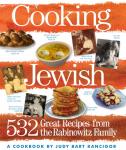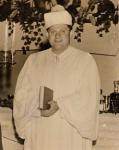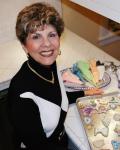
BUY COOKING JEWISH by clicking here now.
Rosh Hashanah memories
When I was growing up, my large, boisterous family would gather in my grandparents’ tiny apartment in Mom and me Belle Harbor, New York, for the festive Rosh Hashanah meal. Papa Harry, who had emigrated from Russia in 1906 as a carpenter, would extend the dining table with boards reaching practically to the walls. The arrival of the aunties with their foil-covered dishes signaled the beginning of the holiday feast, a menu that seldom varied:
Mom and me Belle Harbor, New York, for the festive Rosh Hashanah meal. Papa Harry, who had emigrated from Russia in 1906 as a carpenter, would extend the dining table with boards reaching practically to the walls. The arrival of the aunties with their foil-covered dishes signaled the beginning of the holiday feast, a menu that seldom varied:
For the forshpeis (appetizer) Aunt Estelle’s homemade, lovingly shaped gefilte fish served with Uncle Lou’s horseradish, hand-grated on the back porch to keep out the fumes;
 Aunt Irene
Aunt Irene
Aunt Irene’s golden chicken soup and ethereal matzo balls, followed by Mama Hinda’s roast chicken and brisket with oven-browned potatoes and Aunt Sally’s tsimmes (sweet carrot stew).
The centerpiece of the table was Mama Hinda’s grand spiral challah, round for Rosh Hashanah, the Jewish New Year, a symbol of the endless cycle of life. Only for this holiday would she add raisins, a sweet embellishment to enjoy a sweet New Year.
Sweet notes echoed from the beginning of the meal, as all assembled dipped apples in honey, to the dessert platters wedged onto Mama’s groaning sideboard: Aunt Irene’s dark, dense honey cake, Aunt Estelle’s mile-high sponge cake, Aunt Hilda’s chocolate chip mandelbrot (twice-baked cookies), and Aunt Sally’s apple strudel and taiglach, crisp cookie balls slowly simmered in honey.
Over at the children’s table, a gaggle of cousins, raised practically as siblings, chattered, spilled soup, shouted, squabbled, hiccupped with laughter, fought over drumsticks, dropped crumbs, clamored for seconds, and ran around, as far as one could run in such tight quarters, until a withering look from one of the aunties brought a temporary attitude adjustment, and then it was back to the merriment.
Or so I’m told.
We were never there!
My parents were singers, and as I recall the Jewish holidays of my childhood, no idyllic scene of family gatherings comes to mind. Dad was also a part-time cantor, and we spent Rosh Hashanah at New York’s Riverside Plaza Hotel where Dad, along with a rented rabbi, conducted his magnificent services, complete with choir (including my mom’s glorious contralto) for a congregation that had lost its building in a fire and had never rebuilt.
We took our holiday meal, not with the family, but at places like Jack Silverman’s Old Romanian restaurant on Allen Street on the Lower East Side, where Dad performed club dates throughout the year, joining the ranks of such legendaries as Julius La Rosa, Joey Adams and Myron Cohen.
By my late teens, my parents' holiday gig had moved to the Windsor Hotel in the “borscht belt,” New York's Catskill Mountains.
How to describe the Catskills of the fifties and sixties? A Jewish land cruise – the breeding ground for so many entertainers, glamorous, fun-packed, the buffet that never ended. And as the children of headliners Lillian and Jan Bart, my brother, Gary, and I basked in their reflected glory.
With my dad’s death, at age 52, in August of 1971 – and our move just a few weeks later to California, where my brother and his family had already settled – the party came to a screeching halt.
Rosh Hashanah 1971 is a blurred memory. Mom had come with us, and for the first time, instead of sharing the holiday meal with hundreds of rollicking vacationers, we set a table for eight in our Tustin apartment.
With no memory bank of our own holiday recipes and 3,000 miles away from the family, Mom and I had to create our own traditions. Sure, the aunts sent us their recipes. Brisket and chicken were no-brainers, but we took one look at the gefilte fish and headed for the Manischewitz. Ditto the horseradish. (In later years the food processor made fast work of both!) A round challah we found at Poul’s in Tustin. Our mile-high sponge cake climbed a few inches and collapsed in defeat. And strudel and taiglach? You’ve got to be kidding!
But Aunt Irene’s chicken soup beckoned. Maybe it was the tears of grief, but Mom’s first attempt comforted, nurtured, soothed and succored – Canfield and Hansen are right: Chicken soup truly is a brew “for the soul.”
As the years passed, Mom’s soup morphed into a four-day project. You see, my mother adheres to the “if some is good more is better” school of cooking. Her secret? The whole produce market goes into that pot…or should I say pots! “You’re messing up the kitchen anyway,” she taught me, “so you might as well make lots and freeze some for later. You never know when someone might catch a cold.”
Now at 90, Mom’s not yet ready to hand over the mantle. Sure, these days I chauffeur her as she shops and try to be patient as she sniffs each dill sprig and inspects every parsnip. We scrape carrots and clean chickens together now, and as we do, we reminisce.
More than a course, Mom’s soup is our link to holidays and celebrations past – a memory in every spoonful. That time a guest – a proper Bostonian – lifted his bowl to drain the last drop. The year I broke my foot and friends brought the entire meal, but no one dared suggest making the soup. That holiday I undercooked the Corning hens, and as we waited we kept eating soup and never even got to the hens.
Mom dishes out wisdom as she ladles her soup, teaching me more in the process than how to clean a kosher chicken. This is a woman who never complains (“What do I have to complain about? I have the best family in the world!”), who doesn’t even own an aspirin (“But I don’t have a headache!”), who accepts with grace all of life’s challenges (“I may be alone, but I’m never lonely.”)
While Mom’s chicken soup is the immutable staple of every holiday meal, for the rest of the menu, my MO each year is to try new recipes from the season's bounty of new cookbooks.
Since Rosh Hashanah (which begins at sundown on September 12) celebrates the birth of the earth, I’m irresistibly drawn to “Food to Live By: The Earthbound Farm Organic Cookbook” (Workman, $21.95) by Myra Goodman, cofounder of Earthbound Farm, the world’s largest grower and purveyor of organic produce. (Food writer Linda Holland and chef Pamela McKinstry co-author.)
Ironically, Goodman, whose parents were holocaust survivors, was raised on what her mother deemed “good American food,” like Lucky Charms and TV dinners. “Her idea of a home-cooked meal was minute steak with Accent,” she told me. “The extent of my cooking was toasting Wonder white bread with ketchup and American cheese out of the plastic in the toaster oven. For me, living on the farm was where I really learned to cook.”
This city girl became a farmer by accident when she and her husband, Drew, tended a small raspberry patch in Carmel to raise money for graduate school. “We fell in love with living off the land and growing food,” she said.
Organic was a natural choice from the very beginning. “The former tenant showed us how to use the chemical pesticides,” she recalled, “but we had an instinctive aversion.
"When you grow up in New York, you get food from the supermarket. You can’t see, smell or taste the chemicals. But it’s different when you’re the one holding them and needing gloves and a mask to use on what’s growing in your backyard to sell to people at your roadside stand.”
As a child, Goodman spent holiday meals with her father’s only sister to survive the holocaust and her orthodox family in Brooklyn’s Boro Park. “People who went through the holocaust either got more religious or less,” she reflected. “My parents weren’t really focused on Jewish traditions, but now that I have kids and live in a community with a very small Jewish population – and really being into food as our family anchor – I want to give them a sense of their religious heritage and set traditions through the pleasure of food.”
For Rosh Hashanah Goodman suggests Merlot-Braised Short Ribs with Cipollini Onions. Slowly braised until fork-tender, the beef bathes in a rich sauce of red wine, earthy mushrooms, and balsamic vinegar. Like my mother’s chicken soup, the homemade beef stock becomes a building block for so many other recipes, but store-bought may be substituted.
For the first time Earthbound’s Carmel Valley café, The Organic Kitchen, will offer certified organic round challahs for Rosh Hashana. And what better way to celebrate the holiday than with their organic apples, which honor the earth, and organic Carmel Valley honey.
For dessert I’ve found a dish to satisfy the health conscious and indulgers alike: Streusel-Stuffed Baked Apples from Susie Fishbein’s “Kosher by Design Short on Time” (Artscroll, $34.99)
“On Rosh Hashanah you get special dispensation because you’re supposed to be eating sweet things,” joked Fishbein, who spoke to me by phone from her New Jersey home while on the treadmill. “Our blessing for our friends and family is for a sweet New Year.”
The ebullient Fishbein, who sold 24,000 copies of her first book, “Kosher by Design,” in the first week, began experimenting with baked apples for her diabetic father. “The recipe takes an apple pie and stuffs it into an apple basically,” she explained, “but you’re losing the fat, transfat and crust. Everybody at the table can enjoy this version, whether it’s somebody’s dessert in place of pie or not.”
Fishbein shared one of her family’s favorite activities for Rosh Hashana: an apple tasting. “The holiday falls at a fabulous time for apples,” she noted. “We have these amazing farms near my house, and we go apple picking. I set out dishes with different honeys and apples, mark them with place cards, and we do a tasting. We used to do it with challah, but we’re moving toward a much more healthful lifestyle now.”
Fishbein recalled with fondness Rosh Hashanahs past. “My grandmother used to bring the kreplach (meat-filled dumplings), all those bubbe (grandma) things that somehow got lost and never quite made it into handwritten recipes.”
Her mother’s specialty was caramelized carrot coins. “The Yiddish word for ‘carrots’ is meren,” she explained, “which means ‘to increase,’ so we eat carrots as our blessing for increased health and prosperity.”
Like my family, everyone contributed a signature dish. “My family would pull up, open the trunk, and there would be this sea of aluminum foil,” she said. “I’ve become one of the sea-of-foil-bearing relatives now.”
from The Orange County Register,
September 6, 2007, By Judy Bart Kancigor
RECIPES
Lillian Bart's Chicken Soup
Merlot-Braised Short Ribs with Cipollini Onions

